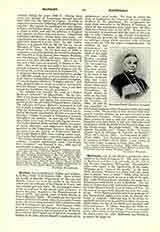

Mathusala, one of the Hebrew patriarchs, mentioned in the book of Genesis (v). The word is given as Mathusale in I Par., i, 3, and Luke, iii, 37; and in the Revised Version as Methuselah. Etymologists differ with regard to the signification of the name. Holzinger gives “man of the javelin” as the more likely meaning; Hommel and many with him think that it means “man of Selah”, Selah being derived from a Babylonian word, given as a title to the god, Sin; while Professor Sayce attributes the name to a Babylonian word which is not understood. The author of Genesis traces the patriarch’s descent through his father Henoch to Seth, a son of Adam and Eve. At the time of his son’s birth Henoch was sixty-five years of age. When Mathusala had reached the great age of one hundred and eighty-seven years, he became the father of Lamech. Following this he lived the remarkable term of seven hundred and eighty-two years, which makes his age at his death nine hundred and sixty-nine years. It follows thus that his death occurred in the year of the Deluge. There is no record of any other human being having lived as long as this, for which reason the name, Mathusala, has become a synonym for longevity.
The tendency of rationalists and advanced critics of different creeds leads them to deny outright the extraordinary details of the ages of the patriarchs. Catholic commentators, however, find no difficulty in accepting the words of Genesis. Certain exegetes solve the difficulty to their own satisfaction by declaring that the year meant by the sacred writer is not the equivalent of our year. In the Samaritan text Mathusala was sixty-seven at Lamech’s birth, and 720 at his death.
JOSEPH V. MOLLOY

